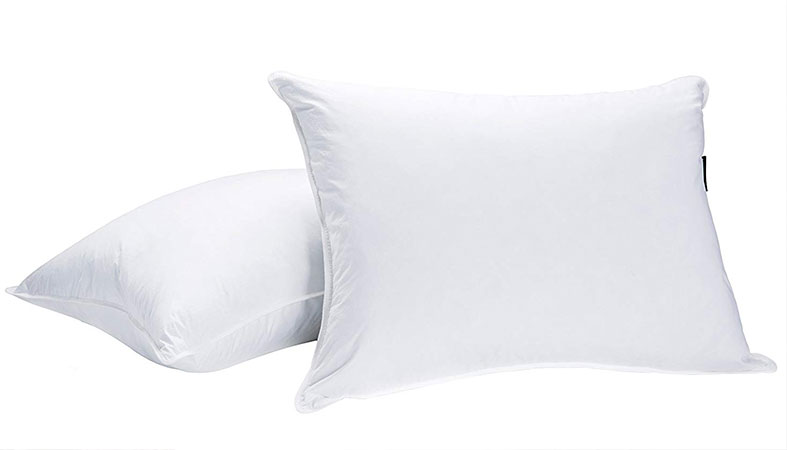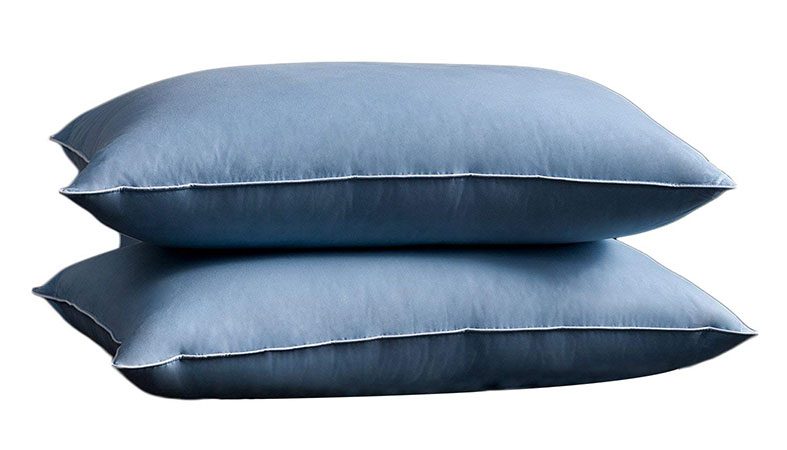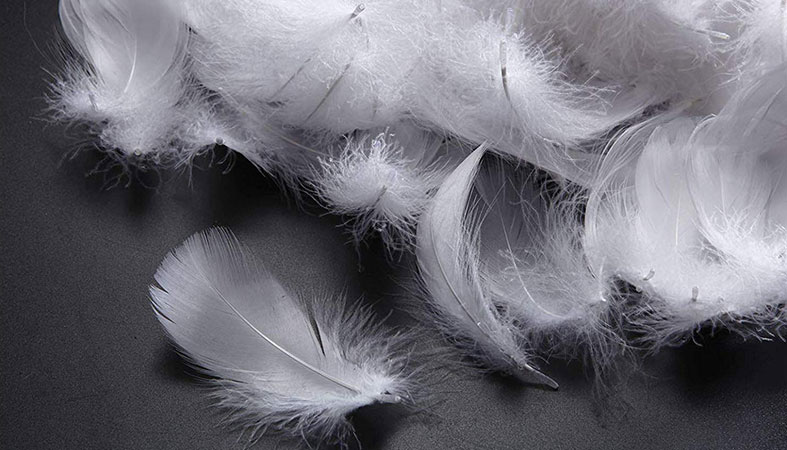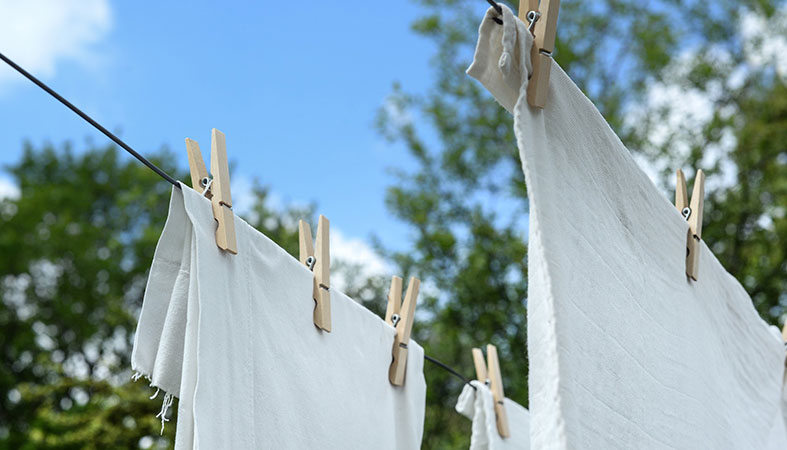You may have heard the terms feather and down pillows used interchangeably. Most people think of them as the same thing, but they’re actually very different.
The materials come from different parts of the animal, and the structure of what’s inside varies as well. For example, down pillows are made from quill-less feather clusters of the chest and underbelly of geese and ducks, while feather cushions are comprised of soft, quill-containing feathers from the wings and backs of the birds.
This article highlights the differences of feather pillows vs. down pillows, weighing the pros and cons of each so that you can get the cushion that provides the best night of sleep possible.
What are Down Pillows?
They are made from clusters of down taken from the chest area of a goose, swan, or duck. They look like the fluffy white dandelions that kids (and adults) blow on to make a wish. Another way to think of the stuffing is like a cotton ball.
When you lie on the surface of these down-filled cushions, it should feel like you’re sleeping on a bed of cotton candy. The clusters compress, though depending on how large or dense they are, you might notice that there is some springiness to the surface.
Down brands are considered the ultimate luxury and often carry the highest price point.
View Our Guide: Best Down Pillows Review
What are Feather Pillows?
When feather pillows are made, the material is taken from the back of the animal and the wings. As you can imagine, each feather has a quill, so over time, thin cushions could allow the quills to poke through. You can minimize the poking by using a protector or thick pillowcase to shield yourself.
The feather-filled types are often combined with down to make them softer. Pure feather varieties tend to have a slimmer profile and can flatten over time as the quills line up.
Down vs. Feather Pillows
Softness
Down material is the softest, though it compresses when you lie your head on it. If you want something fluffier, opt for premium materials and a higher “fill power,” which will be discussed in a moment. Overall, expect down to feel plush while also light and airy.
Feather is not quite as soft due to the presence of quills and the lack of “clustering.” Some have more filling than others, so they can still be soft and fluffy, but they may require manual fluffing during the course of the night or in the morning.
Structure
Down has a clustered structure from the tufts of fur taken from the birds. Premium material is taken from older birds in colder climates making the structure more soft and buoyant than clusters taken from younger birds in warmer climates.
The structure of these pillows could feel looser and compress more than feathers, which might have a hint of crispiness from the quills.
Fill Power
Fill power refers to the amount of fluffiness or height (also called loft) in the pillow. The measurement applies down types only. The maximum fill power number is 850, and this figure represents the highest quality cushion you can get.
Furniture and toys tend to have a fill power of 500, and anything over 650 is considered high quality.
Origin
Some of the best down and feather pillows typically come from Eastern Europe, specifically Hungary. The birds tend to be larger, more mature and provided with a natural environment and humane treatment. Birds raised in China tend to be subject to poor animal treatment standards and cleaning processes.
You can look for certifications like Bluesign, which pertains to environmental and worker standards, as well as products carrying the Responsible Down certification, which prohibits the plucking for down and feathers from live birds, which is grossly inhumane and excruciatingly painful and cruel to the animal.
Enemies of Feather and Down Fill
Compression
Natural fibers tend to break down and compress over time unlike memory foam, which tends to retain its shape. To get around this, invest in high-quality pillows that can last for ten to twenty years. Regular fluffing can also help keep the shape and support.
Moisture
You should avoid getting feather pillows wet. This means that when it comes time to clean them, take them to a qualified dry cleaner.
Down pillows can be cleaned with soap and water, though you must still be careful to treat the materials gently. They must also be dried in a process that takes several hours. Failure to dry the item thoroughly could ruin the product almost immediately.
If you tend to shower before bed, avoid going to bed with wet hair. If this is not possible, then wrap your hair in a scarf or add a pillow protector or extra pillowcase to avoid getting your damp hair on your down or feather cushions.
Moisture can harm the product even before it gets to you! If the items were improperly transported or stored prior to purchase, they could arrive in your home with an odor. Make sure you check these items carefully and return or exchange anything that’s defective.
Oil
Oils from your skin or facial products can also damage your bedding. When possible avoid moisturizing your skin at night or sleep on your back during the early hours of the night to prevent the product from seeping into the material.
Over time, oils from skin and beauty products could cause the surface to turn yellow and may also cause unpleasant odors.
Find Out More: How Oftern Should You Replace Your Pillow
Goose vs. Duck
While both animals provide high-quality materials, goose is the rarer and more expensive of the two. Goose down is known to be more plush and resilient than duck, providing a more luxurious experience as well as a longer life. Here are some other factors to consider:
- Geese are larger, which allows for bigger clusters.
- The chest of a duck is closer to the ground, meaning that their bodies can pick up more dirt and debris that might not come out during the cleaning process. This could potentially result in having to sleep on some lingering odors.
Duck down is more economical and still very luxurious, so you should not feel like you’re getting something inferior if you choose this material.
Down vs. Down Alternative
Down alternative has numerous benefits. Not only is it less expensive, but it can be just as luxurious while also being hypoallergenic. People may want to consider down alternative in the following situations:
- You want a high-quality, luxurious pillow without the high price tag.
- You’re concerned about allergies.
- Animal rights are a top priority for you, or you are a vegan.
- You want to be able to wash your bedding in the washing machine without fear of the items falling apart.
Proper Care
If you take care of your pillows, they can last a long time. Here are some top tips for extending the life of your natural cushions:
- Treat them gently and with care. Compressing them for storage or using them in pillow fights can break down the material more rapidly.
- Use both a protector and pillowcase to avoid exposure to moisture and other elements.
- Remember that down and feather pillows may be washed under special precautions. When in doubt, take them to the dry cleaner.
- Wash your pillowcases regularly to avoid oil and dirt seeping below the surface.
- Avoid hanging them outside during rain or if you live in a humid area.
- Avoid going to bed with wet hair or lots of moisturizer on your face. It could absorb into the materials, exposing them to damaging moisture.
Learn More: How to Properly Wash Your Pillows
Frequently Asked Questions
Which pillow type has more benefits?
Both are equally beneficial, and the right choice may depend on your individual preference. Your sleeping position may also influence your choice.
Stomach sleepers may prefer down because it compresses nicely and can be reshaped while still offering comfort and support. This choice is also ideal for back sleepers.
Side sleepers might want something plusher. A blended cushion made from feathers and down is likely to be a favorite, although a pure feather option could also work well.
Which is better for side sleepers?
Side sleepers tend to need more fill to properly support their head. However, if the surface is too high, it can also put the neck and spine out of alignment. A cushion that is too low, on the other hand, puts excess pressure on the shoulder.
A thicker version that has a high fill power rating for 650 or higher may work best. Alternatively, you can choose a down alternative that delivers all of the plushness without the high price tag.
Read Our Guide: Top Rated Side Sleeper Pillows
Are feather types good for neck pain?
According to Harvard Medical School, feather is an excellent option for helping those with neck pain because it can mold to the shape of your neck, making it easy to customize. Synthetic materials may not give so easily and may be too high or too low.
Want to see more? Check out our pillows for neck pain guide here.
Are these recommended for asthma sufferers?
Many people with asthma are worried about natural materials, but they don’t necessarily need to be. They express concern about being allergic to ducks and geese, but their shed plumage isn’t usually the source of the allergies. Instead, allergy and asthma sufferers are often have allergic reactions to the dust mites inside the cushions.
If you’d like to use one of these cushions but are concerned about allergies, use a dust mite-proof protector on your head cushion to prevent these critters from wreaking havoc on your sinuses.
Conclusion
When it comes to choosing your sleeping surface, you’ve got countless options. Some people shy away from feather or down because of the cost, and there are alternatives that mimic the feel without the expense.
If you’re looking for a more authentic experience, then consider a feather, down or mixed cushion to lay your head. Now that you know the difference between these similar materials, you should be better equipped to make a choice that could ensure a peaceful and comfortable night of sleep.
Jill Zwarensteyn
Editor
About Author
Jill Zwarensteyn is the Editor for Sleep Advisor and a Certified Sleep Science Coach. She is enthusiastic about providing helpful and engaging information on all things sleep and wellness.
Combination Sleeper




